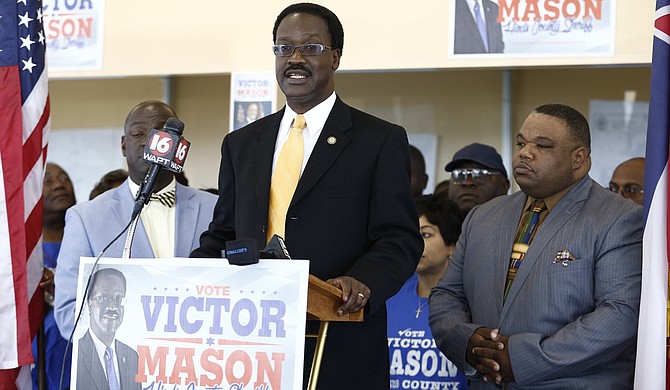Victor Mason, former gang-unit leader of the Jackson Police Department and a former Hinds County deputy (and a close friend of former Mayor Frank Melton) said he wants to bring back mentorship programs to help the youth. Photo by Imani Khayyam.
The political rivals of Sheriff Tyrone Lewis wasted no time in seizing on the findings of a U.S. Justice Department report that prisoners at two Hinds County jails are continuously subjected to violence, from both fellow inmates as well as jail guards.
The DOJ's probe began a year ago after a string of high-profile incidents, including a riot in 2012 that rendered a third of the jail unusable for two years and the deaths of two men. In its report, released May 21, officials from the DOJ cited the jail for "systemic deficiencies in staffing; policies and training; security and classification procedures; physical plant and maintenance; contraband control; and administrative review and other accountability measures to prevent, detect and investigate improper uses of force."
Separate from the DOJ investigation, the Mississippi Department of Corrections got a tip that a state prisoner assigned to the jail was receiving special privileges, including unsupervised overnight stays at his home and was able to earn cash on the side by fixing the private cars of county employees and even kept his horse at the county jail.
Lewis himself has sought to counter the narrative of his slipshod management of the jail with regular announcements of contraband busts in the jail and by arresting jail employees whom he says bring in contraband or help inmates escape. Most recently, his office arrested Jacob Johns and Reginald Butler and charged the jailers with helping four young men escape from the downtown jail, while another jail guard caught sleeping on the job was "dealt with," by unspecified sanctions.
The biggest obstacle between Lewis and a second term is Victor Mason, a former Jackson police lieutenant, who has followed jail developments closely.
Not only is Mason one of three men competing for the Democratic nomination but has long his eye on the sheriff's seat. In 2010, he was fired after he said publicly that he would run for sheriff if McMillin sat out. Now, Mason is Lewis' chief adversary. But Anthony P. Thomas, who's also on the primary ballot could, despite his lack of name recognition, could play the spoiler if the race goes down to the wire.
On June 3, Mason held a press conference at former car dealership and brought together about one dozen detention officers who say they were fired unceremoniously by Lewis, whose office runs the jails, and pointedly criticized the management of the facilities over the past four years.
"After reviewing this document of the U.S. Department of Justice, that was a call to action," Mason told the Jackson Free Press. "That made me realize we had to do something. If you're like me, you're just tired of hearing about (crime), so somebody's got to do something about that."
Mason started his law enforcement career with the Jackson Police Department, and worked for the Mississippi Bureau of Narcotics, JPD's vice and narcotics, intelligence and youth divisions.
Currently, he's on leave from his job as an investigator for the Mississippi Attorney General's office.
His involvement with youth in the criminal-justice system helped him forge a friendship with Jackson Mayor Frank Melton. In a 2009 Clarion-Ledger story published after Melton's death, Mason said while he was a Jackson police officer working in JPD's gang suppression unit, "I didn't like (Melton), and he didn't like me." However, after getting to know the mayor, he realized they were on the same side, trying to save kids' lives. He even helped Melton take a group of gang members to a camp in Texas in the 1980s.
"He was a good person at heart. No one could argue with that. I just didn't agree with some of his tactics. 'I'd tell him, 'Man, you can't do that.' But you know Frank. It was either his way or no way."
Mason is also making juvenile justice a centerpiece of his campaign.
"If you look at the crime that's going on around here now, it's mainly being committed by teenagers and that's just unacceptable. Young people don't have any business committing crimes, and they're the ones with all the guns and things," Mason said last week.
His solution: Bring back role models. "Bring back guys that were in the military, that are willing to volunteer on our team. Bring back normal everyday people that can teach these people the Bible, that can teach these young people the way of life."
He added: "When we were young, we cut grass (for) $2.50. Now you cant pay a child to cut grass. You can pay him to smoke it."
The Good, Bad and Ugly
Predictably, problems at the jail are emerging as a central campaign issue in the sheriff's race. In response to critics of his management of the facilities, Lewis offers a two-pronged rebuttal. First, he says, despite sensational media headlines, the problems at the job are nothing new and have existed since the building first opened in the early 1990s.
"If they do their research, they will see that this problem existed Day 1 in 1994," Lewis told the Jackson Free Press in an interview in May 2014.
Lewis said in an interview with the Jackson Free Press on June 9 that he intentionally did not include fixing the jail as one of his campaign talking points because he never believed that he along could address its problems.
Those problems in the mid-1990s, when Hinds County went into mediation with Dunn Construction, which built the building and the jail's architect Allen & Hoshall Ltd., over a series of problems, including frequent electrical surges and a faulty foundation that kept cell doors from locking properly. The county poured about $500,000 into fixes, and eventually brought in an out-of-state consultant to perform a complete diagnosis. The architects eventually settled their part of the lawsuit for $650,000, news reports at the time show. The building lacks proper drainage and has dropped ceilings, which prisoners have dismantled over the years as a way to get out of their cells by fashioning shanks and other tools out of the metal splines that support the tiles and out of boredom.
Numerous reports have highlighted these issues, including the opposition research report Lewis' campaign conducted against McMillin in 2011 as well as a report issued by a grand jury in 2013 and the recent DOJ investigative report, all of which Lewis says he has welcomed because they highlight problems he's been trying to bring to the attention of the public and the board of supervisors since his administration took over.
The second part of Lewis' defense of his management of the jail is that the public perception that things have gotten worse are because he brought them to the fore.
"When we took over we decided we were going to be transparent, that (we) would no longer continue to sweep things under the rug. We pulled the carpet back," Lewis told the JFP last May.
One of the themes Lewis has hit the hardest is what he calls the tenant-landlord arrangement between his office (the tenant) and the board of supervisors (the landlord). If he, as the tenant, wants to fix the broken windows at the downtown jail, which have figured into an escape and a contraband seizure, jail officials have to ask the county's maintenance department and those order forms sometimes get stuck in bureaucratic red tape.
(It doesn't help that the Hinds County Board of Supervisors is made up of five popularly elected men and women, each with his or her own political agendas and motives.)
The former maintenance employee says that's not necessarily true. This year, he was reassigned from being a detention officer to a maintenance worker assigned to the Raymond detention center and says that any requests related to jail security were prioritized to the front of the pile.
Lewis also admits that "staffing is an ongoing issue," mainly because Rankin and Madison counties and Central Mississippi Correctional Facility pay detention officers and deputies more than Hinds County. It's a fact that is not lost on the maintenance worker, who agreed that based on some of the repairs he made, it's obvious that jail staff failed to check on prisoners for long periods of time.
"You can't cut on stone and not hear no noise," he said.
Unforgiven
Lewis counters the claims of former jail workers that he came into office and started blindly slashing and burning staff.
Rather, Lewis said an assessment of the office before he came into office found inefficiencies, including a top-heavy management structure that included about 30 captains who had no employees under their command. After the assessment, some people were given a chance to reapply for their jobs.
"We didn't fire a whole lot of people. A lot of people just didn't reapply," Lewis told JFP said of what calls a streamlining of operations.
About a dozen former employees on hand for Mason's press conference told a different story. Although most declined to speak on the record, they all characterized Lewis as unnecessarily heavy-handed when it comes to his handling of personnel issues.
"We don't fire people. People fire themselves," Lewis said.
It's a narrative that emerged not long after Lewis took office in 2011. At a courthouse ceremony, Lewis raised his right hand and placed his left hand on a Bible and took the oath of office from Hinds County Circuit Judge Jeff Weill, becoming the first black sheriff in the history of Mississippi's most populous county.
People close to Lewis at the time say Lewis forgot who his friends were who helped him win a close race that included a challenge of the official results.
The decision to be sworn in by Weill, the conservative former Republican city councilman, instead of Tomie Green, the circuit court's senior judge, raised a lot of eyebrows among Lewis' supporters, said Kamau Franklin, an attorney who managed the final leg of Lewis's campaign and for a brief time was co-counsel for the sheriff's office.
Franklin, who now lives in Atlanta, said when the race got close Lewis reached out to then-Councilman Chokwe Lumumba and the Malcolm X Grassroots Movement, which has the organizational know-how to mobilize people.
Lumumba's relationship with Lewis started when Mayor Harvey Johnson Jr. installed Rebecca Coleman as police chief in 2009 instead of Lewis, who was acting chief at the time.
When Lewis geared up to run for sheriff, sources say Lewis convinced Lumumba that he shared the human-rights activist's concerns about the effects of mass incarceration and wanted to make changes to how the jail was run. In turn, Lumumba loaned the Lewis campaign several of his lieutenants, including Franklin and his son, Chokwe Antar Lumumba, and began campaigning with Lewis.
The junior Lumumba, who ran for mayor of Jackson in a special election after his father's death in 2014, said his father's support of Lewis was about half because he believed Lewis wanted to make changes and about half because he was interested in protecting the integrity of the election, which could mean the first black sheriff in the county's history.
After the election, Franklin and the junior Lumumba say Lewis seemed to lose interest in working with Lumumba on jail reform, including adopting a civilian review board, doing away with so-called turnkey fees, which are assessed in addition to bond on release from jail, and expanding educational services inside the jail.
Antar Lumumba said, that with Lewis' victory in hand, "the breakdown in communication happened almost immediately. There was a failure to answer phone calls."
Lewis says he made no such promises. He adds that he doesn't believe a civilian-review board is necessary because the sheriff's department's has a strong internal-affairs department, which investigates allegations against deputies and detention officer. These investigations have exposed corrupt jail employees over the year, Lewis said.
In addition, Lewis brought in new people who had not been involved with the campaign and started pushing Franklin and other Lumumba people to the periphery. Franklin said he lasted six weeks before he was terminated.
"I was going around firing people for him, and behind the scenes I think my people were taking bets on how long I would last," Franklin said.
Despite the desire of some in the Lumumba camp for payback, the elder Lumumba held his people at bay because he did not want any distractions as he prepared to run for Jackson mayor, a race Lumumba won even though Lewis never publicly endorsed his former ally.
"He did respect Chokwe, but he finally got what he needed. In the end, he used us more than we used him," Franklin said.
High Noon
On top of all of the other issues Lewis is up against, another dark horse could make the race interesting. Anthony P. Thomas may lack name recognition, but has enough of presence on social media and with yard signs that he could upset the race for Mason and Lewis.
Thomas, who teaches criminal justice at East Mississippi Community College during the week and lives in Raymond, was a detention officer at the Raymond Detention Center under McMillin when the jail opened in 1993. Like the workers flanking Mason at his press conference, he remembers morale being high and camaraderie being strong jail workers.
Thomas says he's not interested in the playing the spoiler.
"I'm not here to spoil the election. I'm here to win the election. We're out here grinding and knocking on doors," Thomas told the JFP in a telephone interview, saying that his campaign volunteers knocked on 11,000 doors in May.
Chokwe Antar Lumumba, who ran unsuccessfully for mayor in 2014, is backing Mason. Lumumba, who has returned to his practice as a defense attorney, has met with Mason, who said he's interested in forming a civilian-review board.
"I think he's sincere in his efforts, that he's capable and intelligent," Lumumba said.
Lumumba said supporting Mason isn't about getting even.
"We have to have air of accountability," Lumumba told the JFP. "The point is not we're not where we need to be."
Check www.jfp.ms/2015elections for more election coverage.





Comments
Use the comment form below to begin a discussion about this content.